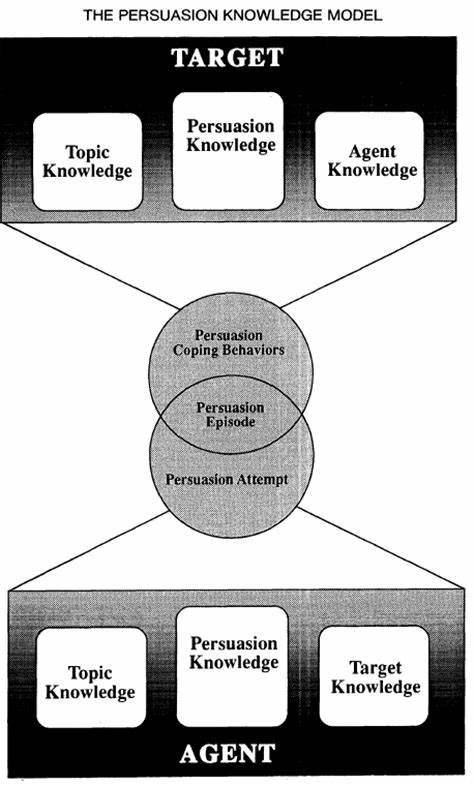34.5 Persuasion and attitude change
Friestad and Wright (1994)
The persuasion knowledge model
Target (Audience), Agent (persuasion message creator)
People can switch roles fluently between target and agent but the knowledge remain intact.
Beliefs about:
Psychological mediators
Marketers’ Tactics
The Effectiveness and Appropriateness of Marketers’ Tactics
Marketers’ persuasion goals and one’s own coping goals
two dimension of overall persuasion competence evaluation:
Perceived effectiveness
perceived appropriateness of the persuasion tactic

Campbell and Kirmani (2000)
Persuasion knowledge refers to “consumers’ theories about persuasion and includes beliefs about marketers’ motives, strategies, an tactics” (p. 69)
Both accessibility and cognitive capacity affect inferences of persuasion motives, which then affect the perception of agent from consumers’ perspective.
Cognitive capacity:
Characterization stage = perceptual and automatic
Correction stage = higher-order attributional processing
Usually, target has more mental load and less cognitive capacity than observers
Accessibility of ulterior motives, affected by:
expectations
strength of association
frequency of activation
recency of activation
Under high ulterior persuasion motive, both cognitively busy and unbusy target use persuasion knowledge to evaluate
Under low ulterior motive, cognitively busy targets are less likely to use persuasion knowledge when evaluating the salesperson.
If the persuasion tactic is recognized as having ulterior motive, then it’s persuasion knowledge.
Ahluwalia (2000)
Baca-Motes et al. (2013)
Commitment in this research was only symbolic (given a lapel pin to symbolize guests’ commitment). But guests were more likely to engage in environmentally friendly behavior.
“Attitude change does not always equate to behavior change” (Ajzen and Fishbein 1977)
Proposed solution to change guests’ behaviors:
Reciprocity concern
referencing social norms
This study posits that individuals’ personal values have better predictive power than beliefs in external norms (Viscusi, Huber, and Bell 2011) (p. 1071) based on the principle internal consistency to avoid cognitive dissonance
Using signaling theory, the authors prime consumers to stay consistent with their signaled commitment.
They have competing needs
They want to be lazy
But they also want to be perceived as environmentally friendly because I said to others already.
Thompson and Malaviya (2013)
Propose skepticism-identification model of ad creator influence
There are two opposing effects:
Skepticism about the creator’s competence
Identification with the creator
Factors that affect the two effects:
Cognitive resources (to scrutinize the message)
Increased source similarity
loyalty toward the brand
Isaac and Grayson (2016)
Campbell, Mohr, and Verlegh (2013)